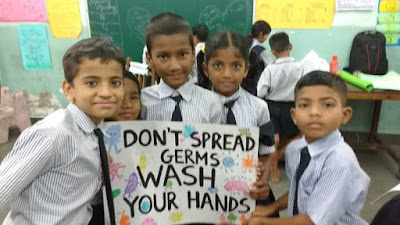| CACR- Project HandWash |
Every day you wake hoping for a better today. There is a
sprint in your step; there is a gleam in your eye; there is freshness in your
soul. All these fantasies crash when you get out of your apartment and start
walking. You realise that the possibility of enjoying the blue sky is zero, zilch,
nil. Because every step is like being in a video game where an unknown enemy in
the form of potholes, bodily fluids, faeces, garbage, spits, is in front of
you.
So, it is great to have a Prime Minister who considers
cleanliness an important part of the country’s policy portfolio. The Swachh
Bharat Abhiyaan has helped to create awareness about hygiene and sanitation and
small initiatives have been started by individuals, groups and corporations as
part of this programme.
One such initiative started is by the NGO CACR (Citizen
Association for Child Rights), ‘Project Hand Wash’ under the UNICEF guidelines.
It was started in August by its Director Nitin Wadhwani, and Project Head Dr.
Richa Singh. It is a 12 session program of 45 to 60 mins with one session per
week.
 |
| CACR - Project Hand Wash |
As a pilot project started in 14 BMC schools between Bandra
and Andheri, it benefits approximately 545 students. As per the UNICEF
guidelines the sessions have a mixture of theory and games to explain the hygienic
and correct way of washing hands and other safe sanitation practices. Activities
like the Hand wash song, catch the ball game,
storytelling, are used to explain bacteria and germs, their effect on our immune
system and the ways to prevent their proliferation in our body.
 |
| CACR - Project Hand Wash |
This programme is a step towards bringing about behavioural changes in the children’s
hygiene and sanitation practices. By educating
students when to wash their hands, the correct way of washing hands,
proper garbage disposal, safe sanitation practices, we hope to lessen the
effects of common diseases like diarrhoea, viral flu, cold and cough on the
immune system. These behavioural changes will help create awareness among
others too, along the way.


